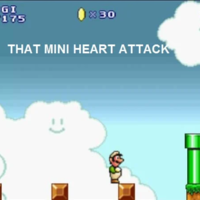Do you even emulate, (Super Mario) bro?
How emulating a system can inspire you to improve as an engineer (no 3-wolf-moon shirt necessary)
- Track: Emulator Development devroom
- Room: D.emulator
- Day: Saturday
- Start: 13:30
- End: 14:00
- Video with Q&A: D.emulator
- Video only: D.emulator
- Chat: Join the conversation!

Even to this day, there's something utterly captivating about bringing to life a piece of software effectively frozen in time, designed to run on what was originally a black box, by means of a device that one uses to check up on cat facts. Adding to this, it can even be enhanced and possibly perform better than its developers ever hoped for.
If you also got to play around with your first computer in the early 2000s, chances are that console emulators were amongst the first pieces of software you've ever run on a computer. Submitting this talk was an endeavour to explore this unexplainable (or is it?) fascination by what seems to conceptually be a compatibility layer. More importantly, the talk aims to have you intrigued about emulation development and the scene in general in the year 2021, by presenting the significance of the emulation community in the context of education and history preservation.
It will also highlight how emulation development is more accessible today compared to the early days of the likes of PSEmu Pro, Project64 and NO$GMB - thanks, in no small part, to the FOSS community.
TLDR: this will focus on the "why" (rather than on the "how") you should have a go at writing your first emulator.
Additional info:
The intention is to provide people that can relate to the below points...
- solid programming background and grasp of computer science fundamentals
- naturally curious about the inner workings of computers
- a general interest in console history
- a little too sceptical as to what business they could have entering territory of the emudev Gandalfs of the 2000s that they looked up to during their school years
- [optional, but desired] having fond memories of their (even-then) ancient Pentium 3 struggling to handle Tekken 3 on bleem!
- (you get the picture)
... with good reasons as to why dipping their toes in emulation development is worth their time, and how writing an emulator is an awesome all-around learning experience, out of which you'll become a better engineer.
Plus, amongst other, to highlight how such a journey is meaningful, rewarding and worthwhile -- as it lies within context you can relate to: seeing your childhood games come to life (or, on the remaining 99% of occasions: using the debugger that you wrote trying to figure out why you can't get past the first screen)
Speakers
| Panayiotis Talianos |